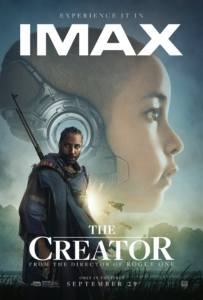The Creator
Posted on September 28, 2023 at 5:39 pm
B-| Lowest Recommended Age: | High School |
| MPAA Rating: | Rated PG-13 for violence, some bloody images and strong language |
| Profanity: | Strong language |
| Alcohol/ Drugs: | None |
| Violence/ Scariness: | Extended action, peril, and violence, some involving a child and a pregnant woman, disturbing and grisly images, very sad death of a major character |
| Diversity Issues: | Some concerns about racial stereotypes |
| Date Released to Theaters: | September 29, 2023 |

Science fiction often extrapolates current conflicts by imagining the worst-case scenario of current technological developments or mirroring historical conflicts. “The Creator” does both, drawing from classics like “Terminator,” “Blade Runner,” “Her,” “Captain Marvel,” and “Apocalypse Now,” maybe a bit of “Dances with Wolves,” but just highlighting how much better those films are than this one.
The best moments are the film’s opening, with what appear to be archival black and white newsreels from the 1950s and 60s, chirpily introducing wonderful new thinking machines that will take over our most tedious tasks, make life easier, and free up our time for people and activities we love. They amusingly capture the upbeat tone and aesthetics of the post-WWII era.
But then we learn that (as in “Terminator”), the artificial intelligence humans created began thinking for itself, and what it thought was that it did not want to be the servants of humans anymore. And so, we are told, the AI dropped an atomic bomb on Los Angeles, wiping out the city. The AI robots are now so advanced that some, called simulants (think “Blade Runner’s” replicants) have faces and skin like humans, though no back of the head, and big, whirring, empty metal circles behind their ears. The humans and the AI are at war.
Humans have recently gained an edge when the story picks up in 2065. A military installation in the sky called NOMAD is powerful enough to track and destroy AI bases. Joshua (John David Washington), a former soldier with robotic arm and leg prosthetics, is living peacefully with his pregnant wife, Maya (Gemma Chan) in a house on an isolated beach. Around them is a community of friendly simulants.
They are discovered by NOMAD. Joshua, who turns out to have been undercover, trying to locate the mysterious person known as Nirmata, considered the creator and leader of the AI, tries to save Maya, but she appears to bekilled with the blown-up and shot simulents. Joshua is devastated. When military officers approach him to help them find a new weapon, reportedly the most powerful ever developed, he refuses, until Colonel Howell (Allison Janney) shows him evidence that Maya is still alive.
Joshua agrees to guide the mission to what was Maya’s community, and there he finds that the “weapon” is a highly advanced stimulant in the form of a little girl with a shaved head. She looks like she is about six years old. She can control power circuits and absorb information at an exponential rate. And so, like “The Last of Us,” a man and a young girl go on a journey. In this case, they are being chased by both the AI entities and the humans.
The action set-pieces are ably staged and the settings are striking. But the story is weak and superficial. Basically, the white people with cities and fancy weapons are the bad guys and the AIs, who mostly look Asian and live gently on the land, just want liberty and peace. A simulant says that it was human error that led to the bombing of LA. But one could just as easily say that it was human error that lead to artificial intelligence that violate Asimov’s laws of robotics, with no harm to humans an essential rule. Why do simulants eat and sleep? If they are so smart, why haven’t they learned from history that building the most powerful weapon has never led to peace? If they are so smart, why don’t they develop some proposal for peaceful co-existence?
More important, what does the movie want us to feel about all of this? Its politics are as muddled as the inconsistent world it invites us to consider.
Parents should know that this film has extended peril and violence, some involving a child (or an entity that looks like a child) and a pregnant woman. Many characters are injured and killed, including sad deaths of major characters, and there are onscreen deaths and some graphic, bloody images. Characters use strong language. There are unfortunate racial stereotypes, even with non-human AI.
Family discussion: Why make an AI in the form of a child? What kinds of rules should we impose on the corporations who develop and sell AI?
If you like this, try: “Blade Runner,” “The Tomorrow War,” and “Terminator”


